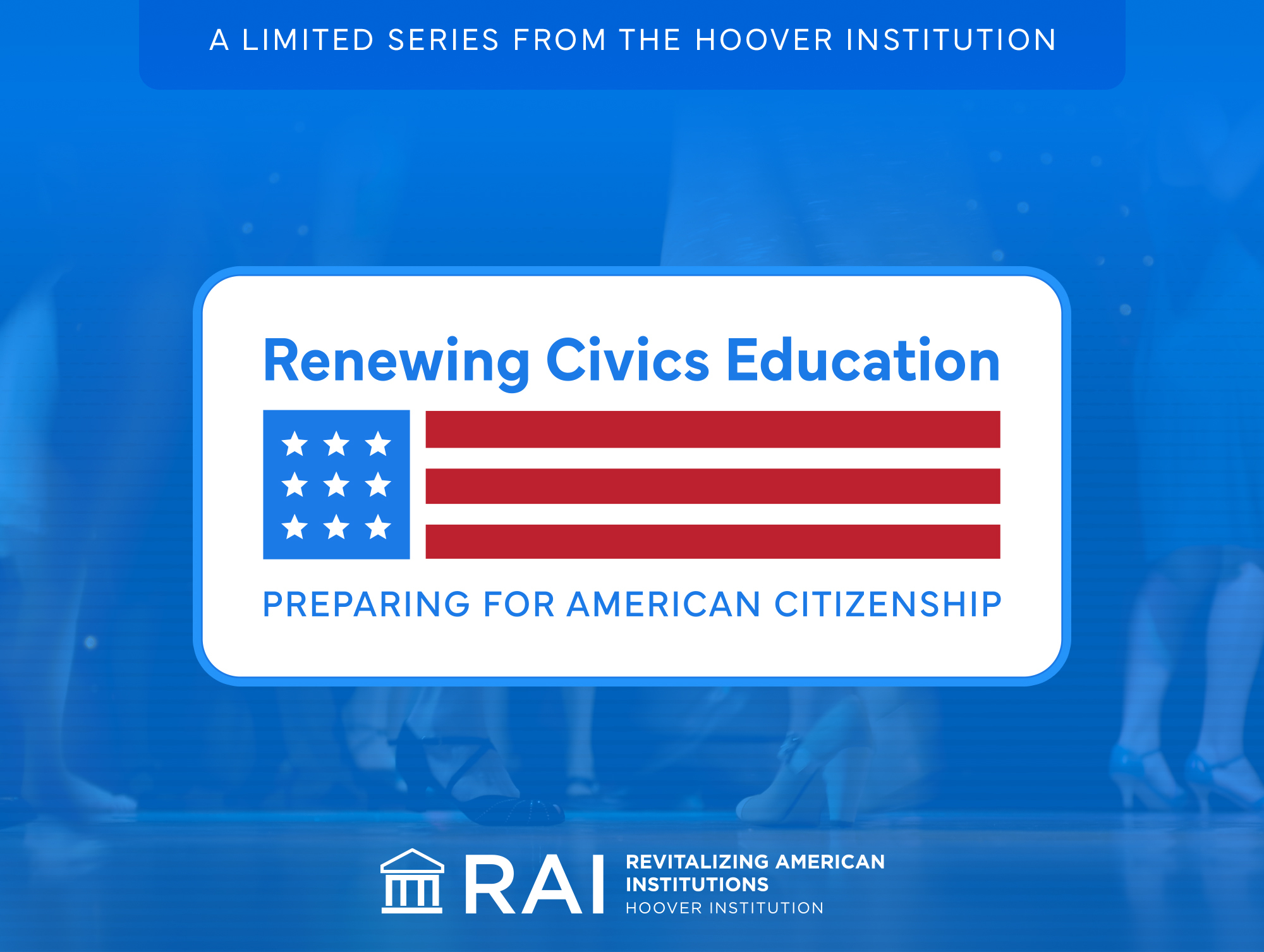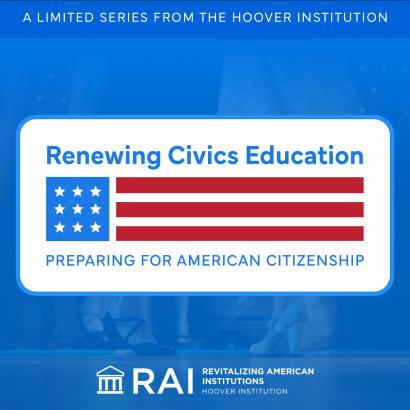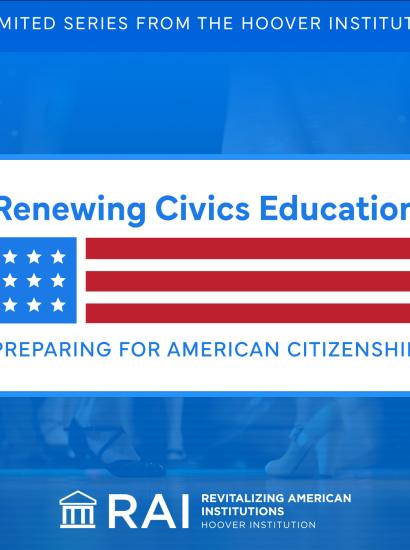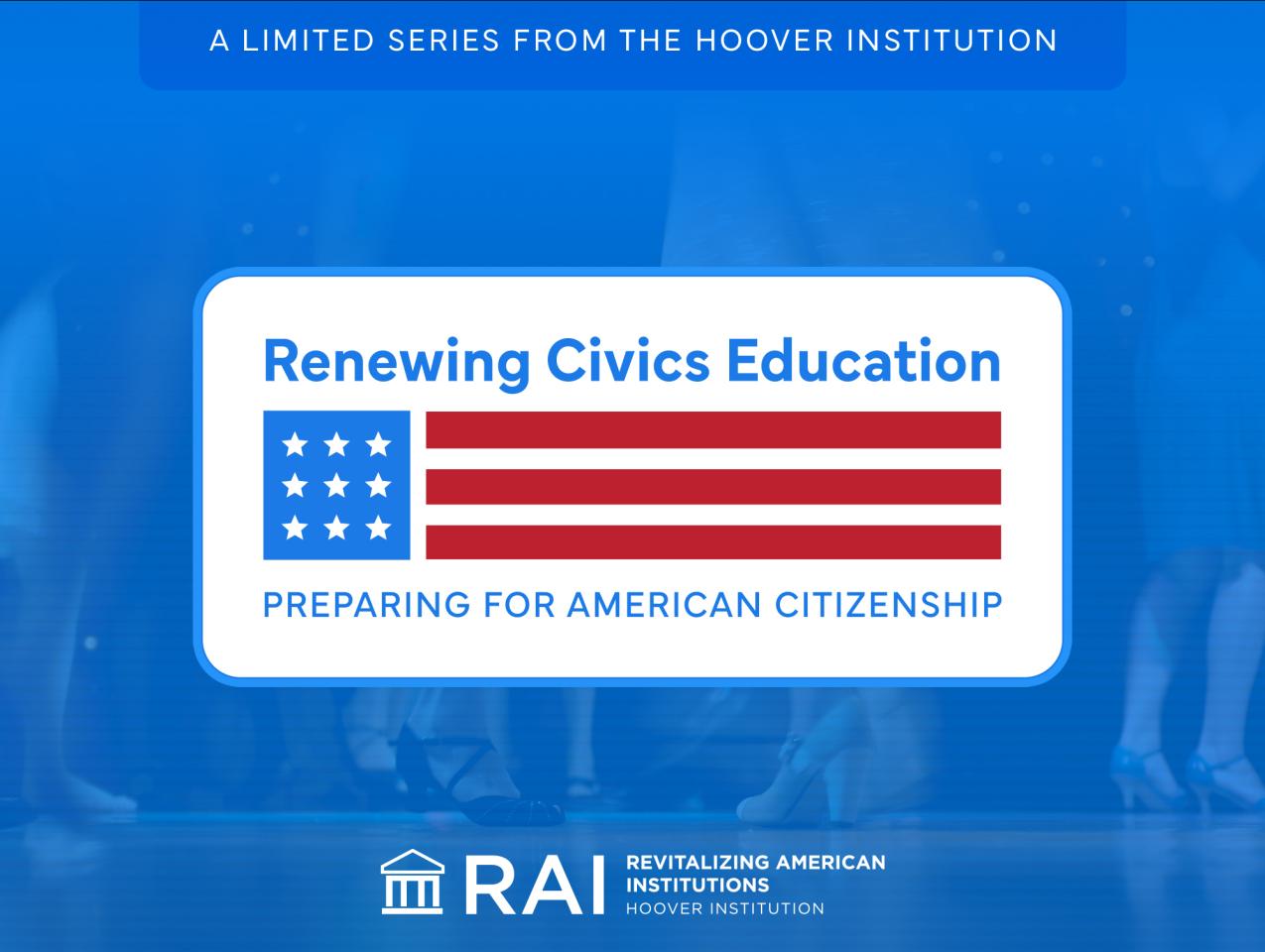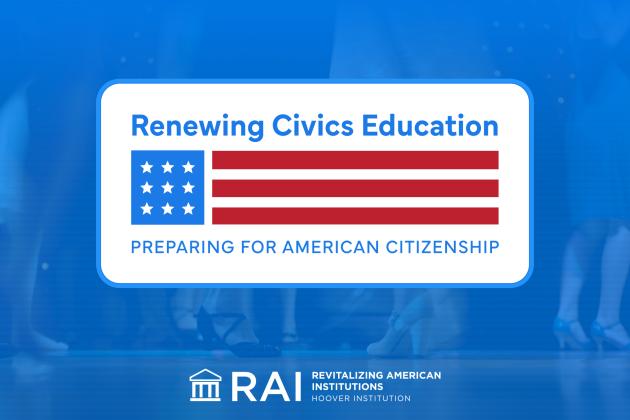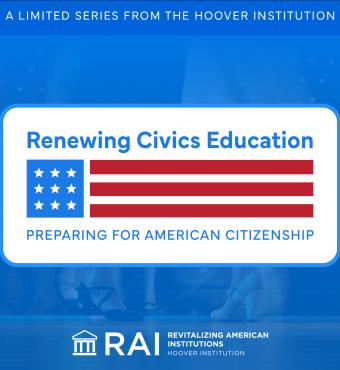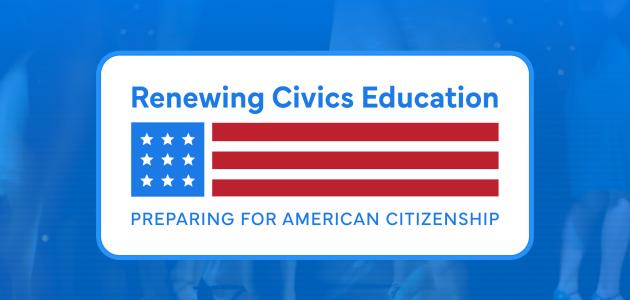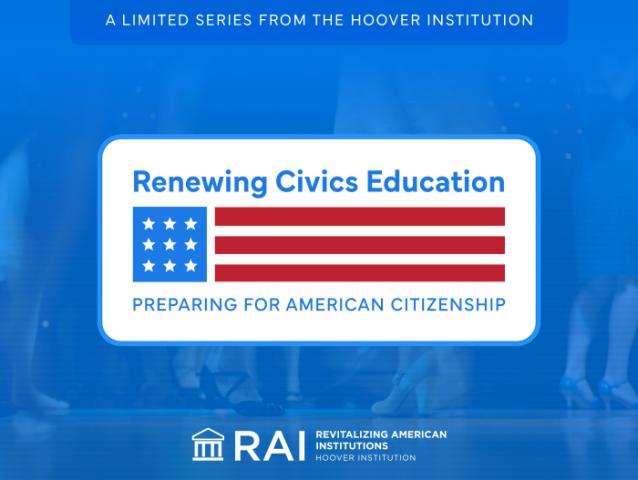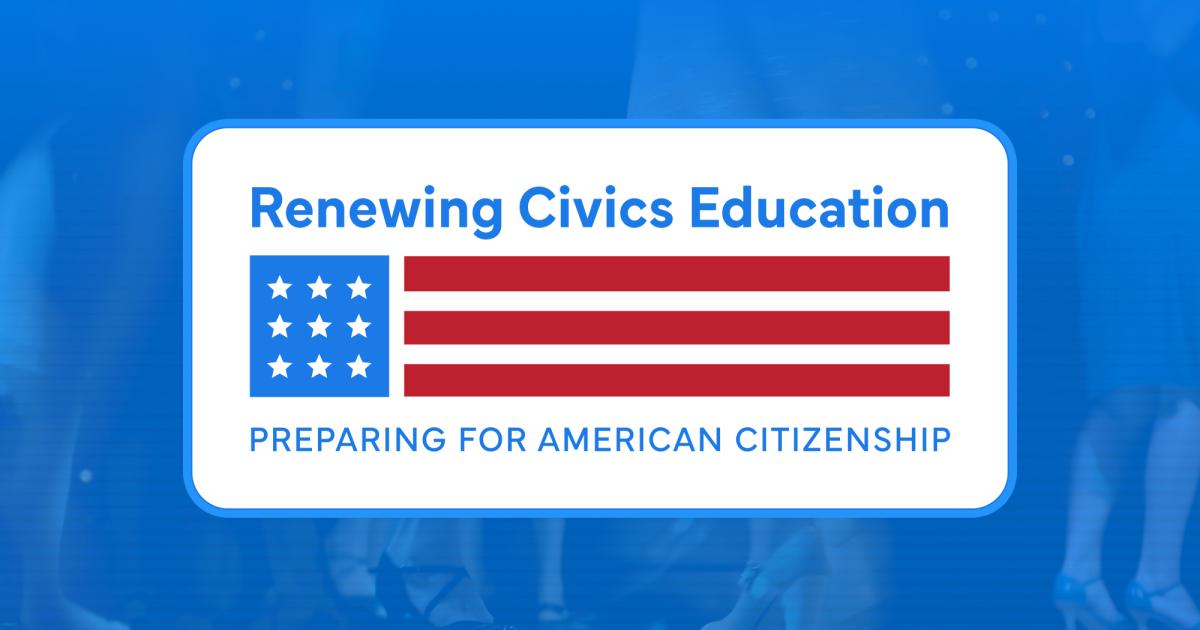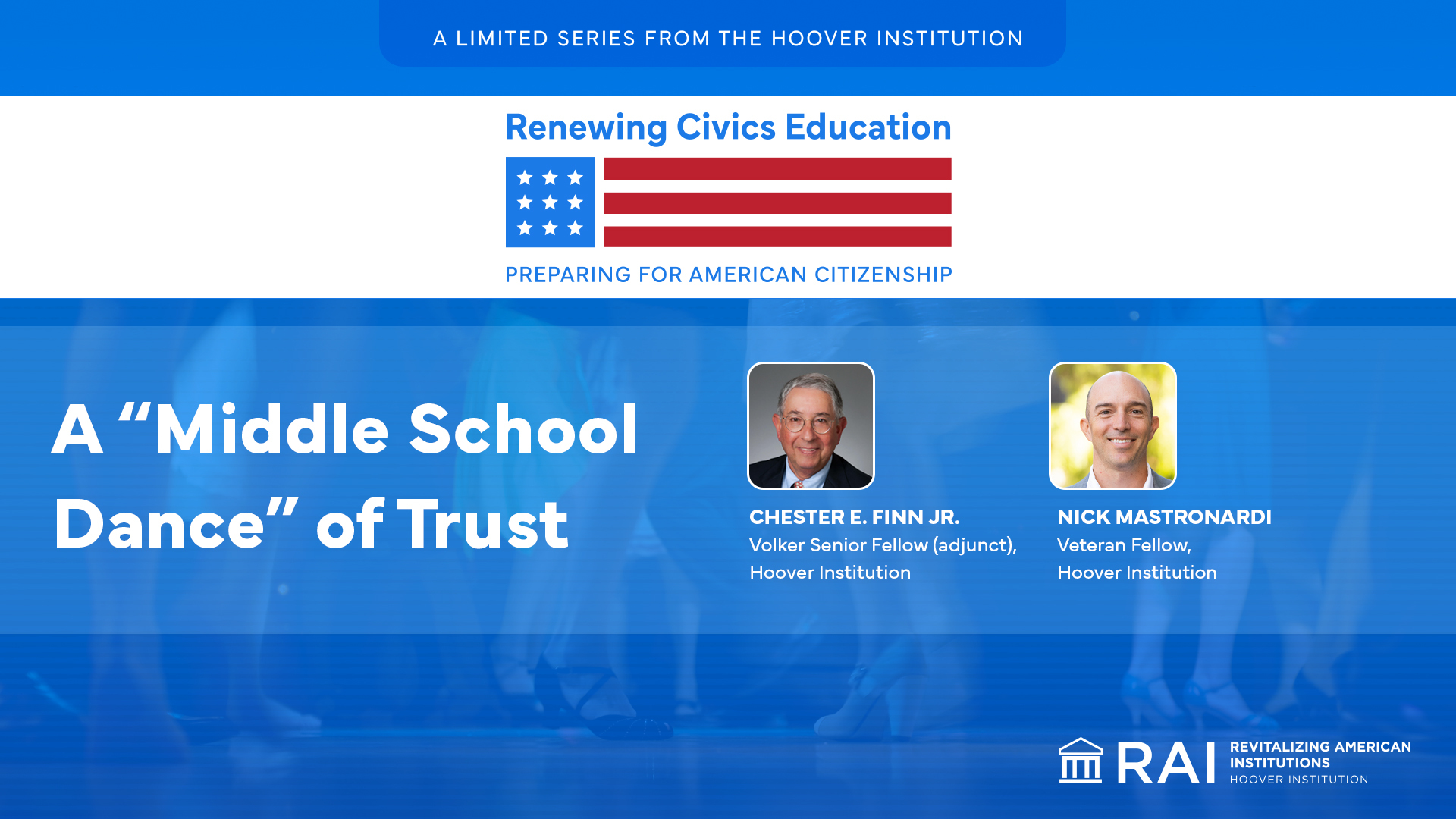- Education
- Democracy
- Revitalizing American Institutions
In an Information Age during which decentralized news and information have contributed to a greater lack of trust in government and traditional media outlets, is it possible to restore confidence in both institutions? Nick Mastronardi, a Hoover Institution veteran fellow and software innovator in the field of public-sector communications, discusses advances in data collection and artificial intelligence and a positive impact on government behavior with Hoover Volker Senior Fellow (adjunct) “Checker” Finn, one of the nation’s preeminent authorities on education policy and innovation.
Recorded on January 14, 2025.
WATCH THE EPISODE
>> Chester Finn: How on earth can you say, as you have done once or twice, that American citizenship has gotten worse because of technological progress? I don't even see the connection between the two.
>> Nick Mastronardi: Well, Chuck, great to see you today, excited to be here with you. And I think technological progress brings a lot of great things with it.
I think until it is adapted to fit a lot of our, the roles of citizenship and some of our public sector, it may be exacerbating or just exposing some negative trends that previously existed and scaling those. So I don't know if technology necessarily is making our institutions worse, but it might be accelerating trends and fault lines that were residing out there, anyway, is my life.
>> Chester Finn: Yikes, that is not encouraging but we'll come right back to it. I'm Chester Finn, known as Checker, on behalf of the Huber Institutions Working Group on Good American Citizenship and its center on Revitalizing American Institutions. And I have a great treat at the moment to be talking with Nick Masternardi, a Hoover Institution veteran, fellow, the head of Polco.
And also a veteran of the Air Force Academy, the Air Force, the White House, the Council of Economic Advisors, and any number of other distinguished activities in his checkered past. Delighted to be with you today, Nick, and thank you, but I wanna stick with this. An example you've given me in the past of technological issues that may be a threat or problem for civics and citizenship is that the fragmentation of media.
How people are getting their information, their news these days from so many different sources? It seems to me there's some advantages to that, but you're also seeing some disadvantages. Can you enlighten us? There's apparently some pros and some cons on this.
>> Nick Mastronardi: Yeah, it's an interesting space. There certainly has been a lot of decentralization in our news media consumption, a lot of variation in the sources where people are getting their news from.
And like you suggested, I think there's some real pros and cons. I think some of the pros are obvious, that more people are starting to go out there, investigate and report and inform others and get varied news sources and that's pretty cool, there's some good benefits. One of the downsides, though, is we end up finding ourselves not always on the same page or the same shared experiences, debating from the same facts and figures that we see in our interpretations.
Our analysis muscle almost gets weak even though we have a better data sources coming in. And so I think at the end of the day, some of those shared experiences really kind of harm us as a society and our citizenship. But on the other hand, I do agree it's pretty neat to see so many different people finding data and reporting on it in our society today.
>> Chester Finn: I used to just believe Walter Cronkite when he told me that that was the news of the day. Now we get it from so many different sources, but do we learn more that way or do we just get more suspicious of what other people are saying?
>> Nick Mastronardi: Yeah, I mean, there's so many people, Reddit and Instagram, even TikTok today, and forms and formats of the information.
And that's great. I think what will be really important is I think the thing that really drives difficulty in being a good citizen is you, regardless of where you get this information. And there's so much out of it out there in different formats that might be really good and digestible to you is what do you do with it?
And as that gets built up and you don't really have an outlet of places to provide input, that has impact men, I think that really builds up some resentment and some negative impacts. And as that decentralization has accelerated, that built up resentment has also, I think, been something that's damaging the sense and actions of citizenship out there today.
>> Chester Finn: Is that what's also contributing to the widely documented decline in trust in government, confidence in government? Because we're learning more about it or we're getting more sources telling us about it?
>> Nick Mastronardi: I'll bounce it, but I'd love to get your take, but I really think so, Checker.
At the firm that I run on my day to day, we do a lot of polling and surveying of local governments of the satisfaction of their citizens with their public services and their trust in government. We do mostly state, but even mostly state and local, and even out of that, mostly local.
And while state and local and especially local have persisted with trust in government above the federal rates. They also have been declining and showing, and even increases in disparity too, by age and gender and wealth and ethnicity. But among all these groups, there has been continued decline. And I no longer think we can just get away with saying for these different pockets and for these different groups.
Their trust and satisfaction with government is higher than federal because it's no longer that you're just healthier than a sick organization, you may also be sick. And I think there really are some root causes that we. And as you are with the center for Revitalizing American Institutions and the working group teams that you're leading.
It's time we come back to it and really assess it and think about things that we can do to restore and reinvigorate citizenship and public trust.
>> Chester Finn: Let's talk for a second about why local is better, even if it's not very good, better than the national. I mean, I spend most of my own life in the education field where it's taken for granted that people have a higher opinion of their own child's school than they do of American education in general.
They'll give an A to their own child's school and a C minus to American education. Help me understand why you think people have a stronger, more positive view of local than of national.
>> Nick Mastronardi: I mean, you can directly see it, you can feel it if your sewer is working, if your streets are drivable, or maybe if they're not.
But you see the impacts more directly, even as a veteran myself, than you may see or feel from defense expenditures and other federal so you're more in touch with the benefits. I would say one of the other, alluding to a previous comment of mine, something to increase trust and your sense of citizenship is your agency and your impact on what you have.
And it's a lot easier to be an influential median voter in your local area, in your school district, city, county, than it is at the federal level. And I mean, you could say the chances of you being the median voter are near zero in any of those circumstances.
But really, I think in today's connected environment, from you to your family and your friend's family, and if you're somebody your friends and family trust. Say there's just 10 people who they would trust your input on a referendum, whether it should pass or school levy or whatever it may be, and they impact 10, 20 people themselves.
You're talking about impact into the hundreds, into maybe what's a small town. And so I think yeah, you see and feel the benefits of your local government around you. But also if you're smart, trusted, respected, you're doing your research and you're connected through these different social media and technologies that exist, you can have agency and impact on good citizenship there.
And I think that's a, that's a positive and I think that's what's kept it above. But even with those positive impacts, we are still seeing declines interests out there we should tend to.
>> Chester Finn: And as I understand it, you spend most of your day giving local governments feedback on what citizens think about the services they're getting from their local government.
Do local governments want to know this? Why do they want to know this? And we give them this information. Do they do anything with it?
>> Nick Mastronardi: Yeah, it's a great question. We hope more do I think and a lot are. I think there really are two benefits if local governments invite input and participation and stoke the positive flame of citizenship among the residents.
One is you just build trust by asking and having that dialogue even in the short run. But if you don't do it well, sometimes that can flame out. I'll just give an example. Like in the early days governments attempted to shoehorn some tools in that were not necessarily designed for the public sector.
They wouldn't just field a survey monkey and people would say, okay, they're asking my input, I'll participate again. But those results of the survey monkeys weren't always trusted because you didn't know if somebody voted ten times or they were being sock puppeted. Was it somebody in another country who was providing input?
And so, in the immediate term maybe, it felt like they were seeking their input, but then it wasn't being trusted, and so that's a little bit deflating. But if you do it in the right venue and you're using results you can trust and you're showing how people's input impacts.
Now I think you're doing in a sustainable way that is re engendering great citizenship. And I think the second benefit if a local government is kind of teetering on this concept of should I invite this is residents satisfaction with public services. Even if it's a perception, but there's a reality to that is a really important data point.
And I think that our government's local, state, federal really need to be embrace a culture of data driven governance. If we're not for an accountability but just to build trust by showing that you did what you said you were going to do or even Taking ownership if you didn't do what you said you were going to do.
So I think there's two things. It's really just building trust by having the dialogue that didn't exist before, but also embracing data to show the progress or lack thereof, but take ownership of it. And I think if we do those things well, I think we're rebuilding the relationship that had been distancing itself between citizens and their government.
It's almost like a middle school dance between the citizens and their government. They're on their separate sides of the room, but let's bring them together. We can all have fun like the old days if we do it, if we reopen that dialogue in a classy.
>> Chester Finn: Way so it's not just the boys on one side of the room and the girls on the other staring at each other.
>> Nick Mastronardi: That's right, yeah.
>> Chester Finn: The. I understand why giving people a sense that their local government is interested in their feedback is valuable for people to feel associated and engaged. But do the local governments, once they get this information, do anything with it or do they just let people report it?
>> Nick Mastronardi: Some do. You'd be surprised. Just for a sense of scale for everybody, there's about 90,000 units of local government across the country in the United States. So about half of those are very small or special districts. But even so, that's in the 40 to 50,000 good sized communities.
I mean maybe a few thousand people, up to 10,000 people and up from that. And I would say today is probably in the low thousands who are fully embracing a data driven governance culture, both data and utilizing communication technology. We wish that would go up. We think it will go up.
I think residents will begin to demand for their tax dollars some accountability. I think also a lot of there's a shift occurring with how these local governments get a lot of their revenue. It used to be, especially over the last few years for from federal grants through state governments and down.
And those didn't always have to be really data driven. But I think we're starting to see with the new administration a desire that, you know, that it be really data driven grant requests either for the federal state grants or for philanthropic community foundational grants. Your application, if it's data driven, is going to be the best chance of getting your government more revenue.
And so are they. No, there are a few who've won the Baldrige Award. Again, the Baldrige Award is an award that goes to the best data driven organizations. And there have been Fort Collins Colorado, I think Coral Gables, Florida. It's always great to see public sector institutions in there and I hope we get more, but I think not a ton.
But the trend's going in the right direction, I hope.
>> Chester Finn: In education, when we give a school or a school district data on how its students are doing and whether it's getting better or worse, we hope they're going to change their ways in response to this data. You're seeing some local governments actually changing what they do when they get this customer feedback.
>> Nick Mastronardi: We do. And in fact we try to be really careful with it because sometimes communities ratings just go up if they attract wealthier residents who are usually more satisfied with public services, especially law enforcement services and so forth. So we've begun to play around with new ratings to identify who is doing the best conditioned on their budget and change in demographics in their community, either preserving or growing.
And we do our best to celebrate those. I'll just give a shout out to Avondale, Arizona. But yeah, I mean there's a lot out there and we see them directly using their results to change their behavior. Countless examples. But I think that act itself is what begins to make the relationship between the resident and the government sustainable is not.
Step one is ask. Yeah, just talk, start, initiate the dialogue, but then listen and continue the dialogue. And then use the data that you gathered to set goals and have a conversation around the progress. And we are then dancing in the dance together.
>> Chester Finn: That's really interesting. I can't think of any examples of a state government, much less the federal government, asking for customer feedback for consumer satisfaction information.
Am I missing something or do they just not bother? And if they don't bother, why don't they bother when local governments, apparently many of them do bother?
>> Nick Mastronardi: You know, from my experience, and this is not exhaustive Checker, as you mentioned at the opening, I've worked a little while at the federal level in the Department of Defense and the Council Economic Advisors.
We really didn't have a great mechanism or means to gather a lot of data in a trusted way. Nevermind historical trends and benchmarks with other federal governments like ours. I think at the local level, this is our laboratory for democracy as it's been stated. And there's more variation and cities like Palo Alto, literally been in Scottsdale, Arizona literally been doing this for decades.
A lot of communities in Minnesota, I think there was a state subsidy to local governments if they use data and in good engagement practices and that's kind of built a hotbed. Colorado, Florida, there's a lot of places where, where it's good. We're starting to see progress unlock right now at the state level.
And I think that really as kind of this middleman between the local government and the federal is a great place to kind of share best practices. And I think, I think the progress will really accelerate as it begins to be in, as it begins to get adopted at the state level.
That just might be me being optimistic, but that's my hope.
>> Chester Finn: I mean I live in the state of Maryland which never asks my opinion about anything and and whereas I do get a weekly email from the county executive reporting on what he regards as progress in his county, I never hear from the governor and much less get asked what do I think of the state police or something in the state, the federal government.
I worry that we may be substituting people's tweets and responses to them for actual public opinion data. Just sort of what's the reaction to something provocative rather than anything systematic by way of how do you feel about the services you're getting?
>> Nick Mastronardi: I 100% agree checker. Maryland actually is making some great strides.
So my hope is Maryland will begin to ask you how you feel on your input. And I think they're going to be knowing you, I think they're going to be amazed with what they get.
>> Chester Finn: They might not like what they get, but go ahead.
>> Nick Mastronardi: I think they will.
I think a way to characterize your second point there is when we leave public sentiment to the the Twitter's exes, social medias of the world, a lot of time what the governments then end up getting and reacting to is just reactive itself. And I think there's an opportunity instead for our governments to be proactive and frame the dialogue and say let's start, let's build a baseline.
What are our goals that we wanna shoot for. So instead of people just reactive or complaining to where we are today, I think a healthier dialogue I would love to see us embrace is together painting a shared vision of the future and making sure that the decisions that we then make together are in pursuit of that citizen formed desire.
Vision of the future.
>> Chester Finn: Really interesting. Back to my education comparison. In in education we have two Sort of mechanisms for trying to make better results. One is a kind of accountability via data for the schools and the districts. The other is the marketplace. People just school choice is is the simple phrase for it, people voting with their feet, leaving a school or a school district if they're not satisfied.
Is this also happening with respect to local government generally? Are people changing communities because they're not happy with the. I mean, at the moment that we are talking, I would leave Los Angeles because I'm not happy with the fire department. But in broader examples than that, are people relocating because of satisfaction or dissatisfaction?
>> Nick Mastronardi: I think that's going to be a trend that was led by the school districts because it's. You have more options just changing your schools. A lot of times with charter schools and private schools in your area that you don't physically need to relocate from or move. But I think now post pandemic with more people working from home.
And I know that's de emphasizing here now slightly, but that did make it possible for people to move with their feet to governments that they felt were incorporating their voice and making better decisions and returns with their tax dollars. So I think so. Although with more people going back to the office, that's less sticky.
But your labor markets are more fluid now. It'll be something, I think you bring up a great point. We should keep our eye on it and it would be a effectively competitive forcing function driving some innovation in the governance process.
>> Chester Finn: That's also really interesting. As you know, we're getting ready for Civic Learning Week in March, middle of March, as well as the Hoover Institution hosted Civic Summit on March 13 that I think a lot of people are going to come to and tune into.
So as we think about, and it's very substantially for civics educators at the K12 and higher education levels, when I think of civics courses as they are taught these days, they don't say much usually about local government. They say a lot about how Congress works, how a bill becomes a law, how your state has two senators, things like that.
But I don't see a lot being taught about your, your town and how it works. Should it, should civics courses take this seriously? And if so, what should they teach?
>> Nick Mastronardi: Man, absolutely, 100%. These are good questions, Chucker. This one's almost a little bit of a softball but.
But I'll take it. I do think, yeah, I think they really should. Our conversation today focused a lot on what the governments can and should do to engender this great relationship between the governments and the citizens and consequently Citizenship. And there's obviously a lot of progress left to be done by the governments, but at the same time, there is responsibility for, for us as citizens to be the best citizen that we can be.
And that doesn't mean just voting in your federal election. It doesn't mean just voting in your state and local elections, although you should do those as well. We should all strive, I think, especially if we are going to demand or request the best from our governments that we give our best as citizens.
And that's being aware of what's going on. I don't think it's annoying if there's a referendum or a bill or agenda item in your local government that's going on and you research it and maybe you go talk at council on a Tuesday night and wait for a couple hours or a chance or even leverage social media or a different platform to let your friends and family know about what's going on.
If they don't want it, you can take them off the distro, but otherwise it's just good citizenship because you are sharing your research on what you think would be best for your community and having a voice and kind of adding to the pot or to the stew that ultimately, I think, you know, it's incumbent we have data and technology tools now to bring lots of voices together and, and help them.
But coming back to Citizenship Week, I think that, yes, all the things that we talked about, let's demand those from our government, like the data and the tools and the communication technologies exist for them to continue to improve. And I don't wanna take it away from the many local governments who've done amazing things.
But let's also focus on the other half of the equation, on ourselves as citizenship, ourselves as citizens, doing the best that we can. And it's just even with your family and it's with your neighbors and it's smiling at people as you walk down the street. Everybody that you got shared social capital within your community, do the best that you can recognize that they're a teammate.
>> Chester Finn: Well, I can't certainly disagree with that, but I'm also still here sitting, feeling like a civics teacher, wondering if. My students even know what a referendum is if it's not in the curriculum. If the curriculum sticks to the national stuff, we might need to revise it so that people know that there's a town council, there's a city manager, there's a water department.
I don't know, we aren't teaching. As far as I know, not many places are teaching this stuff in school or in college. I mean the universities, a number of them are getting serious about civics education for college students, which would be a great thing. is a great thing.
Going to be talking about that incidentally, during the civic learning week that's coming up. But if it's not part of the curriculum, how are people going to find out about it?
>> Nick Mastronardi: You're right. I mean your education background, and you know the best I do. I agree with your sentiment that the curriculum should be updated because you know, I don't think I ever.
I'm tryna think of my own personal journey into learning about the volume of, basically there's about between $3 and $4 trillion a year spent between state and local in the United States. It's a significant amount of our overall economy. And I think a lot of them, when we think about government, just like you said, we think about federal.
But you live in a school district, you live in a city, you live in a county. Each of them have multiple departments, are running many programs that directly impact your quality of life. And you can influence those programs if you just knew a little bit about what was going on, and we leverage technology to better connect you with them.
I agree, education would benefit all of us in this equation.
>> Chester Finn: As we get close to finishing up, let's stick with technology for just a second because we started there. You've mentioned that you see an opportunity for digital venues for working on citizenship and civic participation, not just physical venues.
We all tend to think that civic participation means coming to a meeting, getting in your car and driving to an auditorium where there's a meeting going on. Is there in fact a technological digital alternative to that that we should be trying to develop and make use of?
>> Nick Mastronardi: I'll try to answer this question about being too self serving, but I do want to highlight just because I think it's relevant.
We have continued with my company with Polka, we've continued to build public sector engagement tools that enrich and capture the real trade offs and the intricacies of what's going on. And yeah, in order for you to get the real feel and to hear the emotion of what's being Shared at a city council meeting.
And by the way, it's good entertainment if you haven't been before. Go. It's just like you really can see the, the color and the fabric of your, your local community, things that people care about and why. But we also understand there's a lot of busy families and not everybody can make it out on a Tuesday night.
And so some of our new engagement technologies are helping cities meet residents where they are to get their input in a way that understands the context and the trade offs. Hey, we have only so much fungible budget and there's real trade offs behind this. Where the money comes from isn't magic.
Are we gonna make trade offs on the community pool versus the fire preparedness just to be prone to what's going on today? And so we're doing that, not only with budget simulations so residents can grapple with, understand, and ultimately hopefully appreciate, and better participate in these things, but even in California, there's housing plans to make sure zoning policies going forward are preparing for demographic shifts.
There's climate plans. If we want to make sure that we're doing things in a certain way to achieve climate outcomes, there's costliness. And so we want to make sure, like I think your old fashioned poll, while easy and nice, misses some of the trade offs. And so I think as technology has expanded, and especially now with AI, we're going to have richer digital venues that people can really begin to understand, appreciate, and have better input and thereby impact these important things going on all around us.
So hopefully that wasn't too long of a answer on it, but that's my sense.
>> Chester Finn: Now your mention of AI, of course, makes me wish I had a virtual alternative to my county executive. I would far rather deal with a virtual one than the real guy. But anyway, that reflects my satisfaction with my local government.
This has been fantastic, Nick, and I appreciate it. I'm looking forward to seeing you at Civic Learning Week in March at the Hoover Institution. And on behalf of Hoover and the working group on good American Citizenship, let me thank you and say adios. All the best.
>> Nick Mastronardi: Tucker was a blast, my pleasure. Hope you have a great day.
>> Chester Finn: Thanks so much. Bye.
ABOUT THE SERIES
Educators across the land are preparing for Civic Learning Week in mid-March—with the capstone National Forum at the Hoover Institution on March 13—as the nation also gets ready for next year’s 250th anniversary of the Declaration of Independence. In anticipation of both—and recognizing the urgent need to rekindle civic literacy via our schools and colleges—Renewing Civics Education – Preparing for American Citizenship, a five-part podcast series, takes on the challenges of citizenship education: why it matters, what it needs to do differently, what shortcomings it must overcome. The series features distinguished members of Hoover’s Working Group on Good American Citizenship, led by Volker Senior Fellow Chester Finn.







